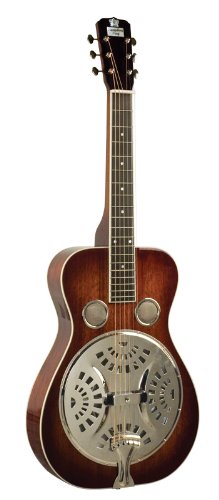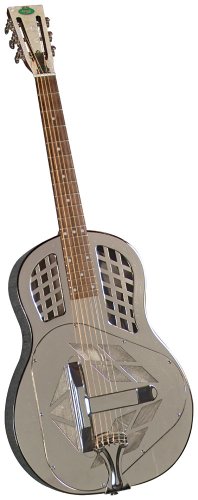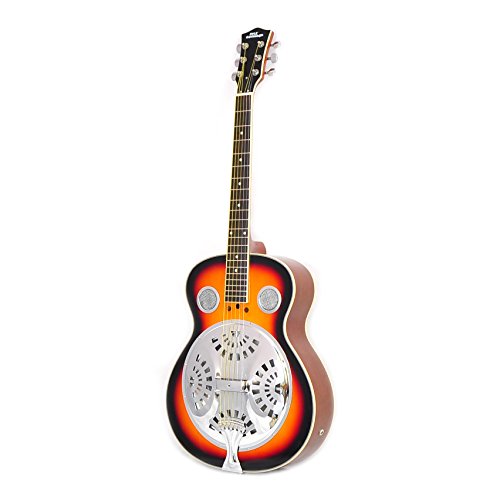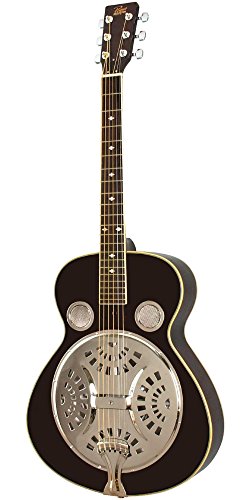Resonator guitars were created in the 1920s to counter the drowning effect of the brass section in bands. They add a depth and volume to the sound of blues and country music that you just can’t get with any other option. Their longer sustain and impressive carrying power combine with a unique tone that just is something special.
When I was first getting started, I thought finding a good resonator guitar would be as simple as buying an acoustic guitar—I had no idea how wrong I was. It took me a long time to find an instrument worth my time, and I wasted a ton of money in the process. To save you the same struggle, I’ve rounded up my research into this review of the best resonator guitars on the market. I hope it helps.
OUR TOP PICK
Of this fantastic list, we put our top pick in the #1 spot—the Regal Studio RD-30MS Series Guitar. This is an easy-to-play option with a classic sound.
The Best Resonator Guitars Reviewed
Last update on 2025-10-31 / Affiliate links / Images from Amazon Product Advertising API
Regal Studio RD-30MS Series Guitar
I consider this resonator guitar among the hottest resonator guitars in the market. I fell in love with it because of its brilliant tones and excellent projection. It sports a beautiful and natural mahogany finish.
Key Features
- Mahogany top, sides, back, and neck
- Rosewood fretboard
- Maple saddle
- Sealed tuners
- 21 frets
What I Like
The Regal RD-30MS features an authentic square-neck that is made entirely out of mahogany. With this style, you can easily play the lap-style slide action. Classical resonator guitars are often played on the lap with a slide rather than on the knee like acoustic and bass guitars.
It also features a rosewood fingerboard as well as nickel-plated tuners and butterbean open-back buttons which are durable and hardy. They easily remain in tune once adjusted.
The Regal Studio RD-30MS gets its unique and crisp tones from the spider cone and bridge that is crafted from American-made aluminum. It is a different design from the regular sound hole that has four sound posts.
What I Don’t Like
On the flip side, the RD-30MS is not an authentic Dobro resonator guitar as the manufacturer claims. It’s a traditional resonator guitar. Also, it doesn’t have an excellent projection.
Pros
- Sturdy mahogany body
- High-quality bridge and cone
- Features sound posts
- Great sounds and tones
- Fantastic for beginner players
Cons
- Limited to lap-style playing
The Regal RD-30MS might be the right choice for beginners who want an affordable resonator with excellent resonance and a solid body.
Rating: 4.7/5
Recording King Roundneck
If you’re looking for a classic look resonator guitar with real wood and a beautiful tone, the Recording King will be a great purchase. It sports a classic look with an old-school sunburst finish and a continental cone. With the Recording King resonator guitar, you get an authentic resonator tone from the early days.
Key Features
- Mahogany top, sides, and back
- Sandcast Spider bridge
- Ebony maple saddle
- Bone nut
- 19 frets
What I Like
You will instantly notice its pleasant and unique sound devoid of quacks and tininess while remaining loud and lovely. It has a bound ebony fingerboard that complements the sunburst to create an aesthetically pleasing and vintage look. With polished and rounded frets, this guitar is quite simple to handle and play, along the neck.
It is extremely well-built and has a sturdy frame that can withstand rough handling. The round hole screens and open-gear Grover tuners make it easy for a player to tune it. Being a classical Dobro-style guitar, you can expect nothing short of well-tuned sounds that sound bright and lush.
What I Don’t Like
Tuning can be a bit tricky because of its geometry, which is slightly off. You may also have to make some adjustment to get the right sound.
Pros
- Easy-to-play fingerboard
- Strong mahogany body
- Great projection and sustain
- Nice continental cone—hand-spun
- Classic Dobro-style resonator
Cons
- Lacquer bloom in coat
- Needs some adjustment before action
The conventional Dobro-style resonator is suitable for players who want to explore the rich sounds of the good old days. It’s beautiful and affordable too.
Rating: 4.4/5
Gold-Tone Paul Beard Signature Series
Designed by the legendary Paul Beard, Gold Tone is a signature edition that delivers a great tone. It’s wholly custom-built and has a round-neck.
Key Features
- All maple Construction
- Decorative flower inlay
- Chrome-plated hardware
- 19 frets
What I Like
This guitar looks very beautiful with its Tobacco Sunburst high gloss finishing. The fingerboard also gets some love with an ebony finish that blends well with the sunburst finish on the body. Its sides and back are made from Maple.
The Gold Tone Paul Beard Signature resonator has a robust projection and a much greater sustain. At the same time, it still produces warm, clear, and heavy tones that are characteristic of round-neck resonator guitars.
What I Don’t Like
Since this is a signature model, it is built for a particular playing style. Usually, it’s played lap-slide style. Its action is Considerably higher than those of other round neck resonators too.
Pros
- US-made Spider bridge and cone
- Crystal tones and loud projection
- Built for lap-slide playing style
- Good for Blues music
Cons
- Not great for flinger style
- Some parts are flimsy
With this resonator guitar, you get a combination of both beauty and performance. It has excellent volume and beautiful looks.
Rating: 4.7/5
Epiphone Dobro Hound Dog Round Neck
Compared to the first Epiphone Dobro Hound resonator sold in the 1920s, you wouldn’t find much difference with the contemporary model. They have maintained the mantra, “if it ain’t broke; don’t fix it.” It spots the classic design and the original classic resonator sound of the original resonator.
Key Features
- Laminated maple body and top
- Mahogany neck
- 19 Frets
- Dobro® cone resonator
What I Like
Without a shred of doubt, this is the best resonator guitar in its category. It has a warm, crisp, and bright tone while still maintaining a tight low-end. It has a balanced high and low tone because of its unique sound-well design with an open F-shape.
Equipped with a single-coil spider-bridge resonator, it is the perfect resonator guitar for country and bluegrass music. The fan pattern plate also increases its projection as well as creating a bell-like effect.
The Epiphone Dobro Hound dog sports a sturdy design with nickel-plated chrome steel hardware. The tuners are made from genuine open Grover tuners with a high-quality finish and build.
What I Don’t Like
The action is a little bit higher than on other resonators. You may have to lower it a bit to get a comfortable playing feel for the fretboard. Once that is sorted, you’re good.
Pros
- Classic Dobro sound
- Sturdy Construction
- Single-coil spider-bridge resonator
- Maintains the Dobro design
- Has Grover tuners
Cons
- Decals wear out easily
- Bridge and nut needs adjustment
Epiphone Dobro is among the few resonator guitars that maintain the original resonator guitar sound and vibe from top to bottom. Because of its round neck, this guitar has an easy strumming and playing position.
Rating: 4.7/5
Regal RC-55 Tricone Resophonic Guitar
Regal makes some of the most versatile resonator guitars. It owes its unique sound and tone to its unusual metal design. You can easily play Blues, Country, Jazz, Bluegrass, among other styles using the Regal RC-55.
Key Features
- Bell Brass back, body, top, and sides
- Nickle plated
- Rosewood fingerboard
- Duolian body style
- 19 frets
What I Like
Built using a Tricone-shared full-brass body, this resonator guitar has a vibrant and robust sound full of luster. When compared to other resonators with a wooden frame, this one has a longer sustain and a powerful projection thanks to its metallic body.
One of the things you will notice about the regal RC-55 is its sweet and warm voicing with a subtle sustain power. It has an aluminum resonator cone coupled with a standard cover plate that has brass slots as well as a biscuit-bridge.
The Regal RC-55 has an incredible neck that delivers fantastic action and excellent playability.
What I Don’t Like
It’s a shame that the RC-55 doesn’t come with a case. Also, it feels more cumbersome than other resonator guitars in its price range.
Pros
- Wonderful tones from tricone-shaped body
- Excellent projection and sustain
- Authentic old-school sound
Cons
- Heavier than other models
- Quite expensive
If you want a beautiful guitar that maintains the authentic classic look, then this is the best guitar for you. It has a sturdy and robust build with a unique and powerful tone projection.
Rating: 4.7/5
Gretsch G9220 Bobtail Resonator Guitar
Looking for an acoustic and electric resonator guitar? Consider the Gretsch G29220 Bobtail Round Neck. Because of its versatility, you will be able to explore both the acoustic world and the electric resonator world with limitless sound and tone possibilities.
Key Features
- Laminated mahogany top, back, and sides
- Solid mahogany neck
- No cutaway
- Fishman pickup
- 19 frets
What I Like
This resonator sports an all-wood design with the body, top, and neck made from mahogany. Also, its fingerboard is made entirely from rosewood. Thanks to its round neck, you can use it to play all kinds of music hassle-free.
I like the design of this guitar and its dual-tone color. I find it highly playable and versatile as I can use it to explore a range of different music styles and playing styles. When boosted, it manages to sound the same as an acoustic guitar but with the sustain power and projection of a resonator.
What I Don’t Like
One of the things the Gretsch G9220 got wrong is the tuners. They feel a bit cheap and flimsy. You might be forced to get a replacement sooner rather than later. The truss rod might also need some adjustment.
Pros
- Dual acoustic and electric playing modes
- High-quality Fishman pickup
- Has both spider bridge and cone
- Genuine wood and box sound and tones
Cons
- Flimsy laminate body
- Tuners are not good
The Gretsch G9220 draws its unique feel and tone from the custom made Ampli-sonic Spider bridge and cone. It has an adaptable and a clear sound that other guitars simply can’t match. Whether you boost it up with an amp or play it like that, you still get a great sustain and vibe.
Rating: 4.6/5
Dean RESCEHB Steel Guitar
Looking for more range on a fretboard of a full metal body resonator guitar? The Dean RESCEHB steel guitar could be right up your alley. It has a brass-plated iron body and what I find captivating about it is its dual acoustic and electric mode for added versatility and a unique sound.
Key Features
- Brass-plated iron body
- Mahogany neck
- Rosewood fingerboard
- Piezo pickup
- 19 frets
What I Like
The Dean RESCEHB Steel Guitar offers a truly amazing and unique sound. Although iron is not quite common when it comes to full metal guitars, its resonance quickly fills any room. You may be even confused by the reverb effect that comes from the distorted sound that is produced by the brass plating.
The other noticeable attribute is its polished sound with great low as well as high action. The secret behind this is its slender mahogany neck and the block inlaid fingerboard. These give it a more electric guitar feel than an acoustic guitar. In fact, this comes out clearly when you plug it in to explore its range of sounds and tones.
What I Don’t Like
Although Dean RESCEHB offers many possibilities, you may have to fiddle about to get the right sound and set up for you, but the results will be great.
Pros
- Full metallic design
- Both acoustic and electric modes
- Top-of-the-range Fishman Pickup
- Wonderful tones and projection strength
Cons
- A bit expensive
- Takes some adjusting to get the sound right
Dean RESCEHB is a fantastic resonator guitar with an impressive range of acoustic to electric ones. It feels comfortable to handle and comes with easy tuners.
Rating: 4.4/5
Pyle Resophonic Acoustic-Electric Guitar
Designed for both the beginner and the advanced players, the Pyle Resophonic is a top guitar with a dual acoustic and electric mode. It offers a unique feel for players at all levels while maintaining a great build and high playability.
Key Features
- Handcrafted spruce and mahogany body
- Rosewood fingerboard
- Nato headwood
- 21 frets
- Includes gig bag, spare strings, pick, strap, and connection cable
What I Like
The Pyle Resophonic sports a hand-built body made up of mahogany and spruce with cherry staining gloss and dual round soundholes. Both the fingerboard and ebony bridge are made from rosewood. It also features chromed tuners that look beautiful.
The guitar also offers fantastic control with its integrated preamplifier that is powered by a battery. The pre-amp features various settings for bass and volume. We particularly love the electronics because they are super easy to use and configure. The dials and levers work just as they should giving you the right levels and sounds.
On top of the robust build, this guitar has a satisfying sound and tone. Its electronic aspect is just as good as its clear acoustics. The fact that advanced users and beginners alike can play it with ease says a lot about the Pyle Resophonic resonator guitar.
What I Don’t Like
The Pyle Resonator has a history of being shipped with some loose parts. You may have to adjust to get the sound you want.
Pros
- Crisp, warm, and vibrant sound
- Possible to customize tones
- Great electronics
- Protective ABS binding
- Beautiful design and look
Cons
- Problematic action settings
- Poor sound quality
As well as being one of the most versatile resonator guitars out there, the Regal RD-30MS has a fantastic design and excellent build.
Rating: 4.2/5
Rogue Classic Spider Resonator (Black Round Neck)
The Rouge Classic is one smooth and silky round-necked resonator guitar that sports a 10-inch resonator cone spun from aluminum and a die-cast spider-bridge. This resonator cone setup provides such a great sustain and projection while still maintaining clean and pleasant tones.
Key Features
- Mahogany sides and back
- Spruce top
- Rosewood fretboard
- 21 frets
- Brass coverplate and tailpiece
What I Like
The Rogue Classic manages to retain a classic look by using a brass tailpiece and cover plate with a chrome-plated bell. The sides and the backs are all made from beautiful and strong mahogany with a spruce top and a black satin finishing.
The back and neck are spun from mahogany. Its rosewood fretboard is inlaid with Nacre diamond shapes. Unlike most other resonator guitars, it has a longer neck which is great for playing in the last fret.
This resonator guitar is highly playable and has great sound and excellent finishing to boot. It has a clear and crisp tune that projects quite well and sturdy build quality when you want to move around with it. Looking at its price, you can tell it is pocket-friendly.
What I Like
When tightened, its strings can produce an annoying buzzing sound. You have to be careful to apply the right tension on the truss rod.
Pros
- Vintage guitar look
- Highly playable resonator guitar
- Great projection and sustain
- Spider cone and bridge
Cons
- Some parts are flimsy
- Need some adjustment
The Rogue Classic is a good option for absolute beginners who want to try a great-sounding resonator guitar with a premium feel without spending a fortune.
Rating: 4.1/5
Best Resonator Guitar Buying Guide
There are lots of resonator guitars out there that we couldn’t possibly cover with our resonator guitar reviews. However, there are some pointers we can give to help you choose the best resonator guitar for your needs.
Square Neck vs. Round Neck
If you are an absolute beginner resonator guitar player or are making a switch from an acoustic or bass guitar background, you might not know the difference between a square neck and a round neck resonator guitar. The two types of resonator guitars have different playing and holding positions and should be among the things you should keep in mind.
Round Neck
This one looks more like the traditional guitar with a curved neck. It is one of the most popular options for people making a first-time switch from a regular acoustic guitar since it has a short learning curve. You can easily play it using a slider or opt for strumming, finger-style or flat-picking like a standard guitar.
If you want to get the best of both worlds, you can easily convert a round neck into a Square Neck resonator with a nut extender.
Square Neck
If you are an advanced player, you might want to try a Square Neck resonator instead. It has an unusual playing position with the guitar fretboard facing upwards using a slide or a bar. It has a slightly sweet sound best for sweetgrass, Hawaiian, or country music.
You will instantly recognize a square neck resonator guitar because it has a chunky neck with wide and squared-off edges. Its nuts are set higher than a regular guitar which makes using the fret impossible. Because of this, they incorporate slides or bars with the frets acting a guide and not for producing sound.
Square necks are fantastic as they produce such rich and sweet sounds. The only problem with them is that they require advanced skill. If you want a fast switch option, you should go for the round neck resonator which you can play like a regular guitar.
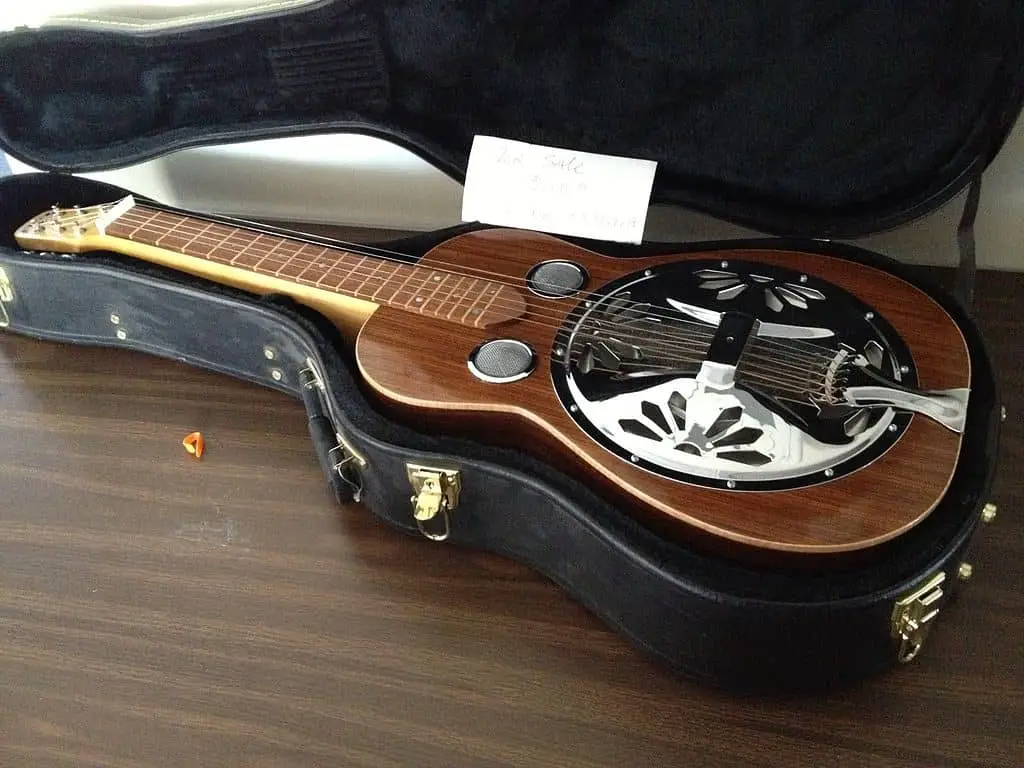
Resonator Style – Biscuit, Tricone, and Spider
Another area you will need to pay attention to after getting either a round or square neck guitar is the resonator style. There are three options, and these are:
Biscuit
If you want a straightforward resonator design with a classic sound, you can’t go wrong with the Biscuit-Bridge resonator. It has one large vertical cone coupled with a wooden disk at the top. The biscuit provides an important resonator tone which may be less refined but very unique. These pure tones pack a stronger punch compared to the other two resonators.
Tricone
Of the three, the tricone resonator is the oldest. It Consists of a T-shaped aluminum bridge that connects three small cones made up of aluminum. The tricone has a sophisticated sound with a longer sustain and a powerful projection. On the flip side, the tricone guitar is quite pricey. Also, it requires more work and time to build compared with the other two.
Spider
This is a downward-looking cone that stays on the guitar in the same way a speaker cone does. The spider-bridge resonator gets its name from the framed bridge with eight aluminum legs and a saddle top. The spider-bridge resonator is mostly used in blues and country music because it produces a longer sustain and offers a nasal tone. With the cone-shaped like a speaker, the sound is projected outwards instead of inwards like other resonators.
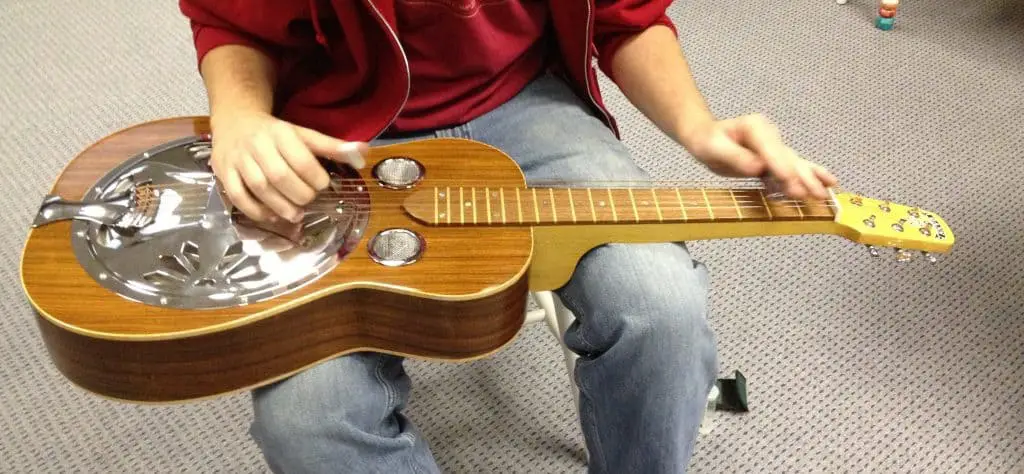
Wooden vs. Metallic Material
The material the resonator is made from plays a crucial role in determining the kind of tone and projection your resonator will produce. Like acoustic guitars, wooden material produces a warmer and fuller sound compared to the stiffer metallic sound of a metal-bodied resonator. The other difference between the two is the projection. Metals have a stronger projection than solid wood.
It is worth noting that the type of material is as critical when you are making your purchase since it is the cone that mostly produces the majority of the sound. In most cases, manufacturers tend to use wood only for aesthetic purposes rather than sound superiority.
Electro-Acoustic Resonator
The resonator guitar was created by acoustic guitar players who wanted their sounds heard over the other musical instruments such as drums and horns in bands. Because they’re louder than your acoustic guitar, the resonator guitar was the perfect fit.
Depending on where you are playing, you might not need the sound of your resonator boosted. You’ll only need to add electronics if you are going for something like a live gig with other instruments or a concert. Given this, if you are a beginner or just an enthusiast, you may want to save on some money by leaving out the electronics.
Final Thoughts
Resonator guitars seem a bit harder to play compared to acoustic and bass guitars. However, with a bit of practice and the right resonator guitar, you can make a full switch from acoustic or bass guitars and play like a pro. Depending on your playing level and where you are playing, you could save a few bucks by following our simple resonator guitar reviews. We have presented the best of the best among the hundreds of resonator guitars out there. We’re confident you’ll find the perfect choice for you here.











